101 Search Results for recipes
September 4, 2014
by Carole Zangari -
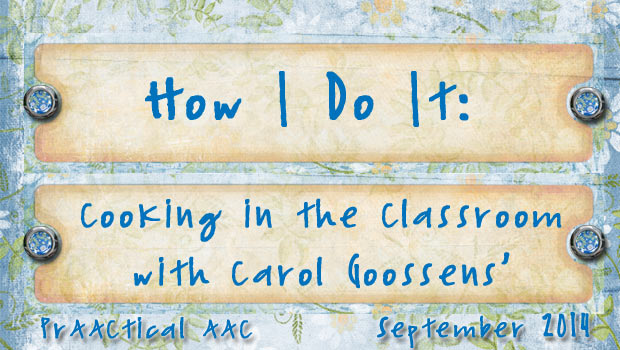
There is something about fall that puts us in the mood for cooking. Today, we are honored to learn from an AAC pioneer, Dr. Carol Goossens,’ who is an SLP and special educator based in the New York City area. She has consulted extensively in a variety of classrooms serving the full spectrum of children with special needs. Carol has presented both nationally and internationally about her collaborative work with teachers, therapists and families. She is known for her ability to seamlessly integrate technology in the classroom and for developing innovative ways to help children learn …while having fun doing it! In this post, she shares one of her latest projects, making animated recipes for using in cooking activities in the classroom. Cooking appears to be motivating for most children … the magic of putting together ingredients that ultimately become something delicious to eat. Teachers, speech-language pathologists (SLPs) and occupational therapists (OTs) often use food preparation activities... [Read More...]
May 14, 2014
by Robin Parker -
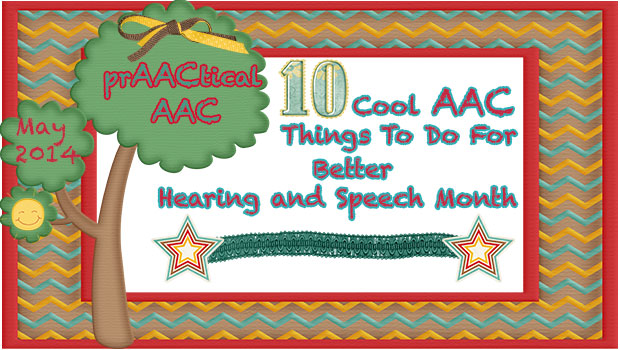
Learn with AbleNet University. Watch excellent free AAC webinars. There are live and recorded webinars so you can learn at your convenience. Share the information with colleagues and families. Give an AAC Gift. Create AAC informational bookmarks and distribute to educators, staff, and families. Print some free communication boards. Go to the PrAACtical AAC e-Tool Box and print out some great core word or activity specific communication boards. Put in your AAC clinic tool box or share with educators or families. Debunk AAC Myths. Use our AAC Myth buster quotes. Print and hang in public spaces so everyone can be an AAC myth buster. Learn and PrAACtice a New AAC System (device or app). Go to prAACtical AAC’s Teach Me Tuesdays and choose an app or device to learn- (Alexicom, Proloquo2go, PRC Accent, The Grid, Tap Speak Button & Sequence, Avaz, Tobii C8, Proloquo4Text, Go Talk Now Text, Nova... [Read More...]
April 1, 2014
by Robin Parker -
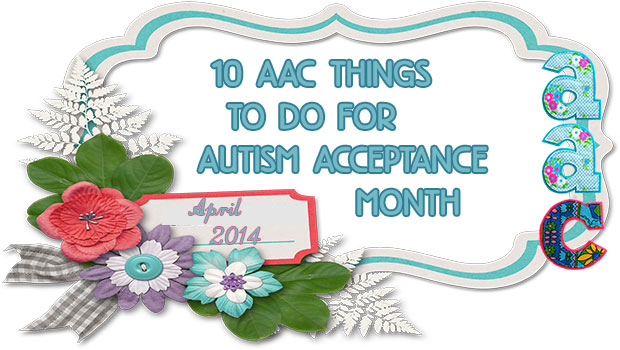
We love Autism Awareness and Acceptance Month. There is so much excitement and great community activities. The month becomes very busy so we love choosing events and projects that facilitate autism acceptance and AAC learning. We pass out materials, have contests, do extra trainings and have many public awareness events. We make sure to support our events and activities with AAC materials. Here are some of the things we do and recommend to support AAC and Autism learning. Please share any activities or projects that you know about. Bake, share, & eat some desserts. Use and include visual recipes when cooking. Need inspiration?.. Go to Your Special Chef for shopping lists and recipes. Educate peers visually by using the Autism Acceptance Book: Being a Friend to Someone with Autism by Ellen Sabin Develop & Use a personal participation story (modified social story) to let alert someone that this will... [Read More...]
March 6, 2014
by Carole Zangari -
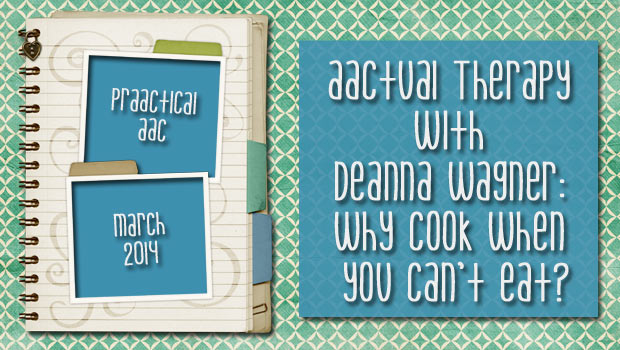
One of our prAACtical friends loves to think about, talk about, and participate in anything to do with baking. Not all that unusual unless you consider that he has a g-tube and doesn’t eat in the conventional sense. So we were incredibly excited have this guest post by SLP Deanna Wagner, whose prAACtical ideas for teaching AAC using cooking activities appealed to us right away. You can read more about Deanna here. Why Cook When You Can’t Eat? I have been thinking about writing this post for a number of weeks, now. And have come up with many different answers to this question, “Why cook when you can’t eat?” I finally decided I should just talk about how we use cooking activities to reinforce communication skills and let the reader can come up with his/her own answer to this question. Whether I am working in a school classroom or with adults... [Read More...]
November 30, 2013
by Robin Parker -
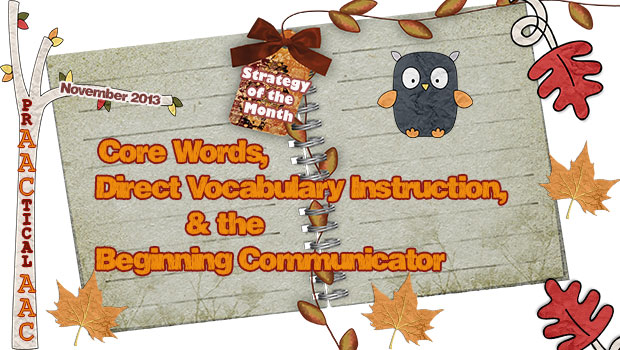
Direct vocabulary instruction is important for all level learners. The beginning communicator needs to learn core word vocabulary from USING the words and one of the best ways to learn how to USE core words, is to receive specific direct instruction with many opportunities for active participation. 6 Essential Philosophies & Strategies Vocabulary instruction involves a systematic TEACHING process. Add vocabulary or Words as an activity on the daily schedule and then have a mini-schedule for the specific vocabulary instruction activities for that day. Initially, apply an errorless learning paradigm. Then, gradually, add comprehension checks, but do not wait for ‘proof’ of comprehension before adding new words because we often notice that the beginning communicator will demonstrate comprehension during ‘unexpected opportunities- or when you are least expecting it. Once learners become familiar with some of the specific vocabulary activities, then have some choice making opportunities as to which ‘word activities’... [Read More...]
November 4, 2013
by Robin Parker -
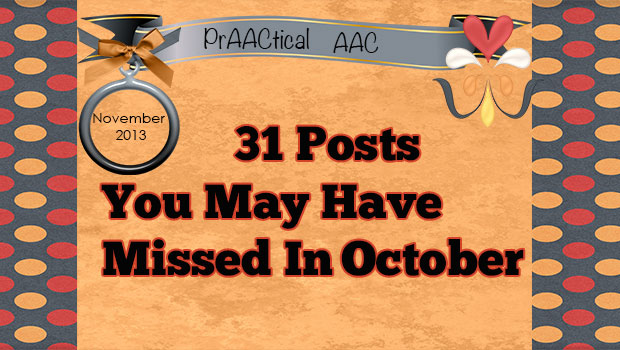
Strategy of the Month Building Participation Building Participation with Older Learners Classroom Participation Community Participation PrAACtical Thinking Second Annual AAC Awareness Month Celebration! 5 Fun AAC Things to do to Get Ready for Halloween 30 Posts You May Have Missed in September Celebrate AAC Awareness Month with PrAACtical Giveaways Another PrAACtical Celebration How Can we Make ‘Clients’ ‘like’ Using their AAC ? 6 Things to Learn from Talking AAC Communicative Competence in AAC Throwback Thursday Core Word Round Up Celebrating AAC Awareness Month 2013 Halloween Recipes for Cooking AAC Style Fast FAACt- What 24 Cents Will Buy Perception & Presuming Competence 5 Ways to Promote Consistent AAC Use What Went Well How I Do It Implementing AIded Language Input with Alicia Garcia 5 AAC Things I Wish I Had Known with Deanne Shoyer Teach Me Tuesdays Alexicom AAC Proloquo2Go Video of the Week Everyone Communicates- Advocacy & Inclusion Developing Communicative Competence... [Read More...]
October 4, 2013
by Robin Parker -
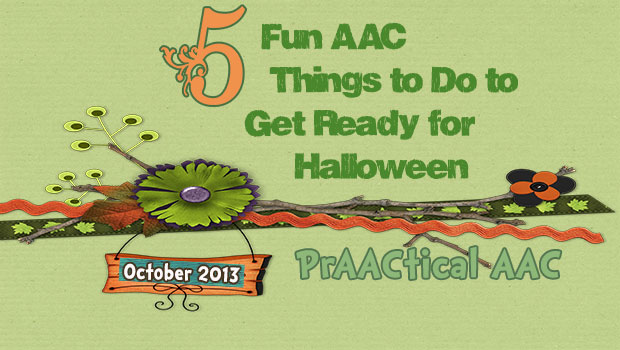
We love to start planning for holidays early. It helps facilitate conversation before, during, & after exciting activities and events. When we begin using core and fringe vocabulary early, frequently, and authentically the learner has the most opportunity for success. Use Schedules: Use a monthly calendar to have a Halloween countdown, Use mini-schedules to make food recipes, spooky science concoctions, or even to plan the trick or treating routes. Use a small talk app like Fat Cat Spooky Chat to prAACtice what you will SAY (October core words) on Halloween. Use a social narrative to prepare everyone for what to expect on and around Halloween. More Halloween social narratives can be found at Autism Community, One Place for Special Needs, Katherine Sanger You Tube, & Kentucky Autism Training Center Prepare a choice board of Halloween costume options and let the learner decide on the costume. PrAACtice a script to be... [Read More...]
August 16, 2013
by Robin Parker -
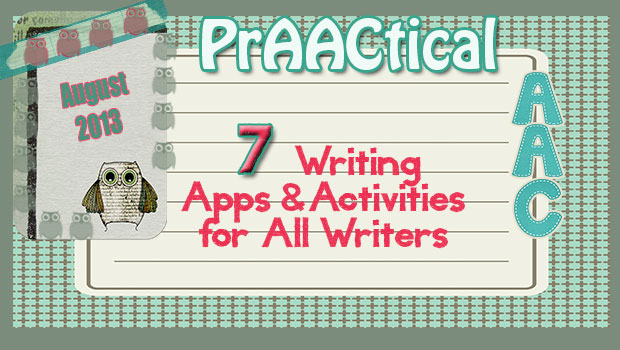
These are some ‘non-traditional’ but really fun apps and activities that can be used to help improve writing, choice making, & AAC skills for all levels of writers. These apps allow you to create meaningful language experiences through the process of creating the written documents, by talking about & printing out the finished product, as well as by using writing specific reinforcement so that the learner knows they are really a writer (“wow, you are an author”, “great writing”, “awesome using many different words”, “excellent poetry”, etc.). Have fun and write. Type Drawing– TypeDrawing allows you to enter text or choose from a text word bank to draw lines or pictures. The text is repeated each time you begin drawing or touch and drag on the screen with your finger. We used this to make text pictures and then sent the pictures as notes to friends, birthday cards to a... [Read More...]
August 10, 2013
by Robin Parker -
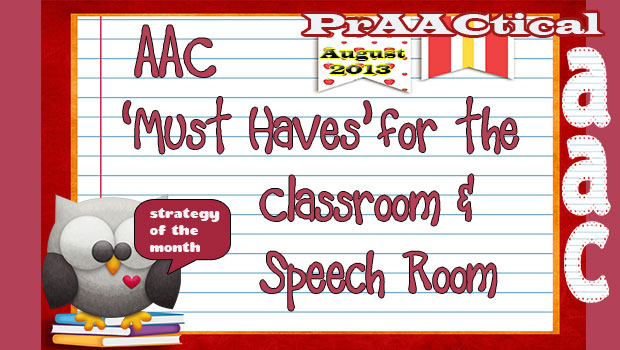
As we were getting ready for back to school and thinking about ‘must haves’, it quickly became apparent that it is not so easy to narrow it down. And the ‘must haves’ would definitely vary depending upon type of class, students, and even school. Based on a wide variety of differences, we organized a wide variety of choices to explore (we apologize in advance if we got carried away but…). Choose what you need, bookmark what you may need later and let us know your ‘must haves’ for a classroom and speech room AAC collaborative approach. We will create an ongoing list. Get Started Before School Starts Do these 10 Things to Get Started with AAC if you are new to an AAC student or classroom Provide AAC Support in the Classroom. Support teachers and educators with tips from Jane Farrall, & learn about AAC in the Classroom by Joan... [Read More...]
July 3, 2013
by Robin Parker -
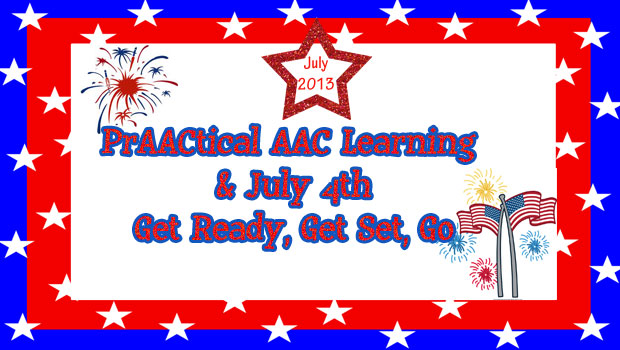
Begin the July 4th conversation now, talk about it on the 4th as it is happening, and then summarize the experience on Friday (after) with pictures, conversation, writing, and reading. We love holiday celebrations for the preparation as much as the celebration itself. It builds excitement AND gives us a chance to prAACtice core words as well as begin special activities. If you have not already started, today is a good day to introduce a social story™ especially if a learner has difficulty with loud noises (firecrackers), crowds or lots of people, new foods (picnics) or routine changes. A participation story is also helpful just to prepare learners for the celebration activities. It is also a good idea to develop meaningful language activities about July 4th today. Get some great free stories from TarHeel Reader – July 4th Books. Make art projects, play games, sing songs, prepare recipes which will help teach new... [Read More...]









